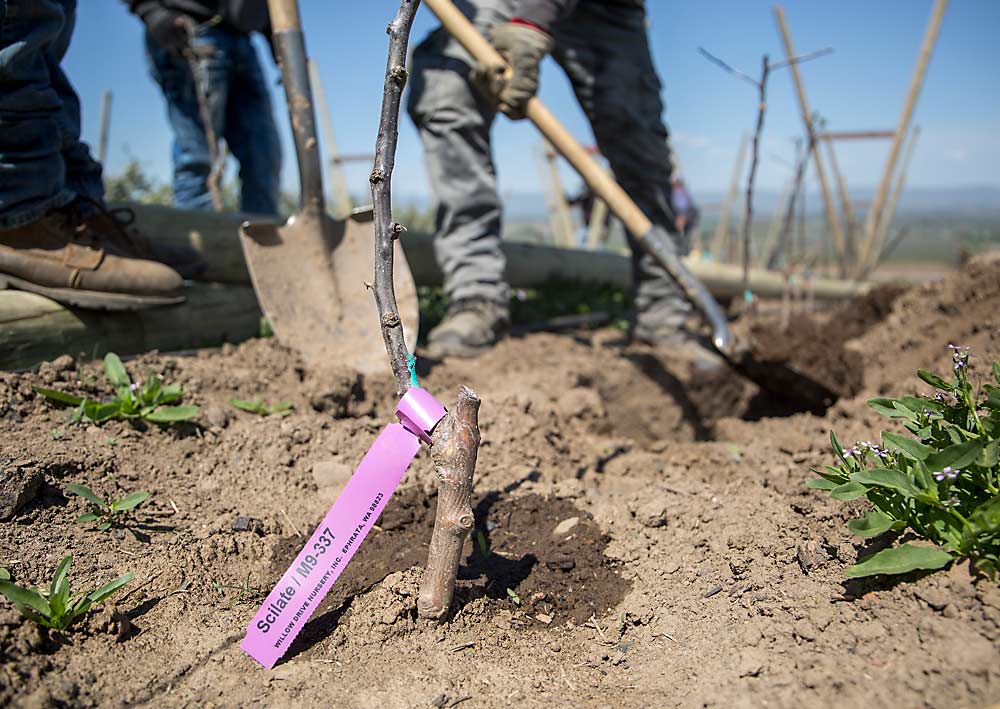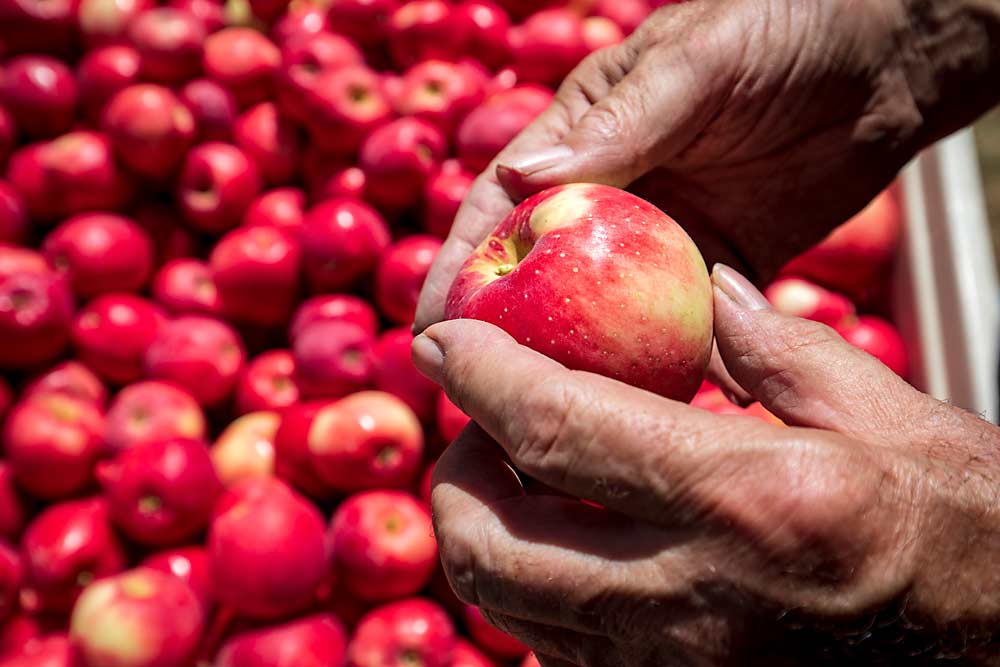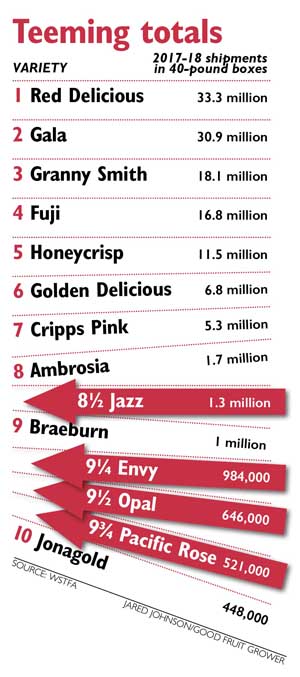
The Jazz apple has a claim to the top-10-apple-by-volume list from the Washington State Tree Fruit Association, extricating itself from the “other” category. The International Fruit Tree Association has discussed SweeTango and Smitten apples on tour stops. The Washington Tree Fruit Research Commission may partner with club owners to fund projects.
As proprietary varieties make up more of the tree fruit portfolio, industry groups that support growers through education, statistics, research and marketing are searching for ways to navigate the fine line between collectivity and exclusivity, to acknowledge the rising importance of clubs in a way that respects the people who can’t grow them.
“We’re aware of it and we are trying to devise several ways how to address this in a way that basically takes into account everybody’s needs in the industry,” said Ines Hanrahan, executive director of the research commission.
So far, clubs have not scattered the puzzle pieces too far, but those days are changing. In 2018 alone, 40 percent of the new apple acreage in Washington was planted with club varieties, according to a survey of nurseries. That means big changes in the state’s variety profile in three years, when those trees come into production.
“I want to have a plan ready,” Hanrahan said.
Research funding
As the Tree Fruit Research Commission enters its second 50 years, the commissioners have been discussing this dichotomy. On one hand, the group has turned down research proposals that would have focused too heavily on proprietary products, Hanrahan said. Some of those have been club varieties, but also products.
However, if the commissioners think growers at large may learn something through club varieties, they fund it, Hanrahan said. For example, the commission has begun funding a $267,000 three-year project led by David Rudell and Jim Mattheis, U.S. Department of Agriculture researchers in Wenatchee, Washington, to explore carbon dioxide damage tendencies and to develop best storage practices for a host of varieties. Among them will be WA 38, Washington State University’s apple to be sold under the trademark Cosmic Crisp, and several club varieties with known sensitivity to CO2.
Hanrahan and the commission also are searching for examples of collaborative funding around the world, including in New Zealand, home of ENZA, which holds the global rights to Jazz, Envy and Pacific Rose, three of Washington’s leading club varieties.
Other times, club license holders have paid for their own research and shared results with the industry. ENZA paid for a project about spur extinction and let other growers know the outcome, said Rick Derrey, ENZA coordinator for North America. The company also has paid for some of the pollen tube growth modeling by Virginia Tech researchers.
Meanwhile, ENZA growers pay research commission assessments just like everyone else. “If it’s in everyone’s best interest, it’s in our best interest,” Derrey said.

Presentations and tour stops
The International Fruit Tree Association is known for educational tours around the world. Local board members in the region hosting the tour usually arrange the stops. They think carefully before making an event too exclusive, but can’t just ignore orchards with club varieties, said Lisa Jenereaux, president of the International Fruit Tree Association and a grower in Nova Scotia, Canada.
“This is part of our apple industry now,” she said.
At the 2017 summer tour, Michigan grower Mike Wittenbach told tourgoers he had recently planted SweeTango apples, a proprietary variety from the University of Minnesota, and planned to add Smitten, another New Zealand club. He didn’t delve into the horticultural nuances of how they grow, but he discussed things growers should consider if they want to enter the club game, including time commitments, harvest windows and market demand.
Besides, people can learn from things they don’t have, Jenereaux said. Few orchardists in Nova Scotia grow Fuji apples, but she still pays attention when they’re on a tour in other regions. She can’t grow the WA 38, but she has Cortlands; both have similar apical dominance growth habits. They don’t have pressure from oriental fruit moth in Nova Scotia, but she still wants to learn about the pest.
“We don’t all have the same things,” she said.
Skewing the numbers
The Washington State Tree Fruit Association compiles statistics for the state’s industry. Club varieties throw a wrench into those, too.
For example, of Washington’s 133 million boxes of fresh apples shipped in 2017–2018, 448,000 of those were Jonagolds — only 0.3 percent. But Jonagold is listed as one of the 10 separately tracked varieties, often misconstrued as a top 10 list.
Jazz apples, an ENZA proprietary variety, totaled 1.3 million boxes, more than twice as many, though they are lumped into the “other” category because the shippers of club varieties probably already know what they have, said Jon DeVaney, president of the association.

Graphic: Jared Johnson/Good Fruit Grower)
Besides, the organization, based in Yakima, is saving that Jonagold slot in its list for WA 38, a managed variety open to all Washington growers but no others in North America, DeVaney said. The industry is gearing up for large volumes of the apple.
The organization’s other efforts, such as leading educational efforts about food safety and lobbying state government, don’t change with varieties, DeVaney said.
Export marketing
When it comes to export promotions, the Washington Apple Commission plans to steer clear of proprietary varieties, even though the group has permission to do so on a limited basis, said Todd Fryhover, president of the Wenatchee-based commission charged with collectively marketing Washington apples in international markets.
As branded varieties became a bigger share of the Washington apple pie, commission staff has frequently asked the U.S. Department of Agriculture if they may use Market Access Program, or MAP, funds to promote clubs overseas. The latest answer is yes, Fryhover said. If they already have a promotion touting open varieties, such as in-store samples, they may add a proprietary variety to the mix, at the request of the retailer, with MAP funds. The commission usually purchases the apples they demo.
However, the commission has decided to not play that card, Fryhover said. Proprietary varieties have not reached high enough volumes to promote, while demand for club varieties, or even expensive public cultivars such as Honeycrisp, is high enough in the United States that they don’t need export help. International markets typically like Washington’s tried-and-true varieties, namely Red Delicious, but to a growing degree Gala and Fuji.
“The more that we can assist by moving them offshore, the better the domestic market will be,” Fryhover said.
The exception will be WA 38, when trees in the ground start producing, Fryhover said. The commission will market that overseas.
“Cosmic Crisp will be interesting,” he said. •
—by Ross Courtney






Leave A Comment